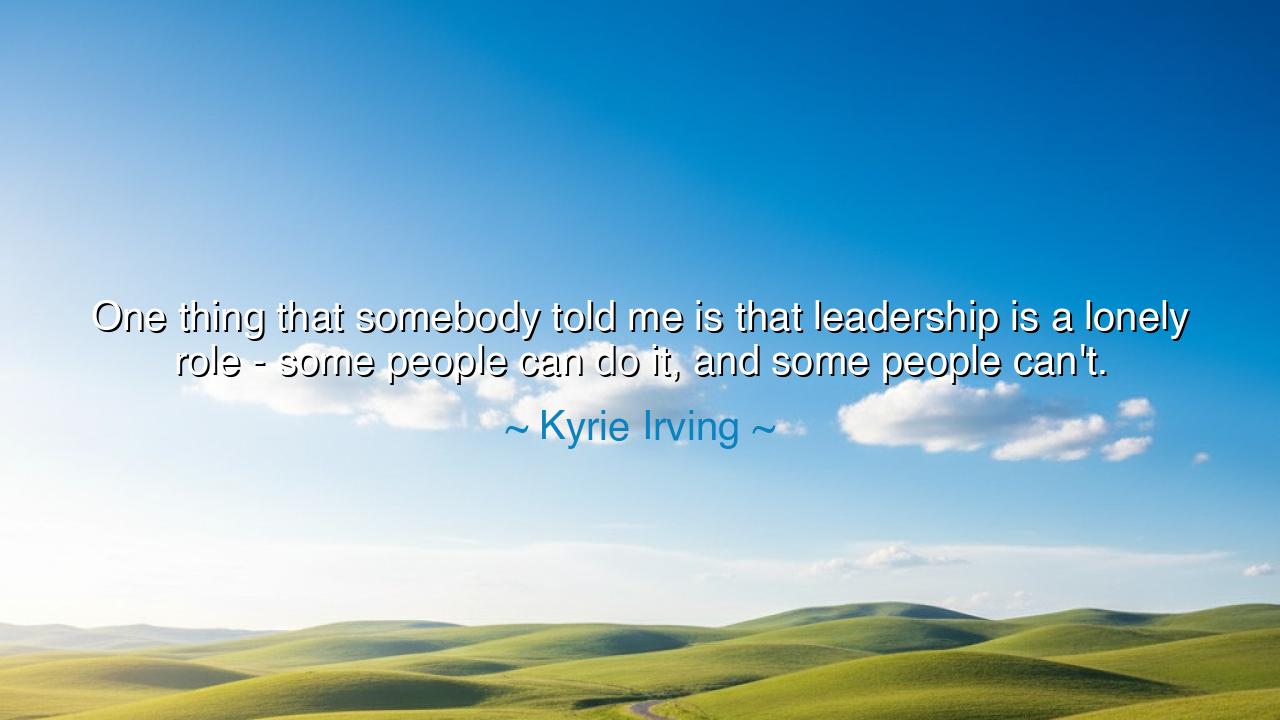
One thing that somebody told me is that leadership is a lonely
One thing that somebody told me is that leadership is a lonely role - some people can do it, and some people can't.






Hear the words of Kyrie Irving, who confessed what had been told to him: “One thing that somebody told me is that leadership is a lonely role—some people can do it, and some people can’t.” This truth, though born in the courts of sport, resounds across the ages, for the burden of leadership has always carried with it solitude. The leader, standing at the front, must often walk where others fear to tread. He bears the weight of responsibility, the sting of criticism, and the silence of nights when doubt gnaws at the heart. Truly, leadership is not merely a crown of glory, but a cloak of loneliness.
The meaning of loneliness in leadership is that the leader must make decisions others are unwilling to make. He must see further, take risks, and shoulder blame when things fall apart. Companions may walk beside him, but the final responsibility rests on his shoulders alone. It is this solitude that tests whether a person can truly lead. Many long for the applause of leadership, but few endure its silence, its isolation, and its burden.
History is filled with examples. Consider Abraham Lincoln during the American Civil War. He led a fractured nation through its darkest hour, but he bore immense loneliness. Criticized by allies, despised by enemies, and haunted by the cost of war, he often walked the path of sorrow alone. Yet it was in this solitude that his resolve was forged, and by enduring the loneliness of leadership, he preserved a nation. Lincoln’s story proves Irving’s truth: some people can bear this role, and some cannot.
Contrast this with leaders who crumbled under the weight of isolation. King Saul of Israel, though chosen to lead, faltered when loneliness tested him. Instead of trusting his vision and bearing the solitude, he sought approval at any cost, disobeying his calling, and losing both kingdom and honor. His failure shows us the danger of those who cannot endure the solitude of leadership: they trade conviction for comfort and power for popularity, and in the end, lose both.
Irving’s words also reveal that leadership is not for all, nor should it be. For it demands not only vision and courage, but endurance of solitude. It is a calling, not a prize, and it requires a soul that can stand even when others do not understand, even when friends turn away. This loneliness is not punishment, but purification, teaching the leader to rely on inner strength, on principles, and on faith in the greater cause.
The lesson for us is clear: if you are called to lead, do not expect constant companionship or unbroken approval. Expect seasons of loneliness, and let them strengthen you. Do not run from solitude, but embrace it as the furnace that forges character. For leadership is not about being surrounded by followers, but about guiding others even when you stand alone. And if you cannot endure such solitude, do not covet the role, for it will break you.
Therefore, beloved listeners, let your practice be this: when you lead, prepare your heart for loneliness, and let it deepen your resolve. Surround yourself with counsel, yes, but be ready to make the hard choice even if none walk beside you. Draw strength not from the number of voices in agreement, but from the truth that burns within. And remember always Kyrie Irving’s solemn truth: leadership is a lonely role—some can bear it, and some cannot. If you are chosen to bear it, endure the solitude with courage, for it is the price of guiding others toward the light.






AAdministratorAdministrator
Welcome, honored guests. Please leave a comment, we will respond soon